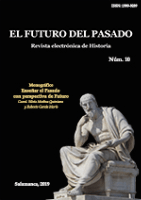
Futuro del Pasado-Revista Electronica de Historia
Scope & Guideline
Illuminating History, Inspiring Tomorrow.
Introduction
Aims and Scopes
- Exploration of Scandal and Social Norms:
The journal frequently examines the theme of scandal, particularly in relation to women's roles and societal expectations throughout various historical contexts. This focus highlights how public perception and social norms have influenced historical narratives. - Interdisciplinary Methodologies:
Research published in this journal employs a range of methodologies, including archival research, textual analysis, and social history approaches, to provide a comprehensive understanding of historical events and cultural phenomena. - Focus on Marginalized Groups:
The journal places a strong emphasis on the experiences and contributions of marginalized groups, particularly women, in history. This perspective seeks to recover and highlight voices that have been overlooked in traditional historical accounts. - Historical Education and Memory:
Articles often address the implications of historical memory and education, examining how historical narratives are constructed and taught in different contexts, and their impact on contemporary society. - Cultural Consumption and Representation:
The journal includes discussions on cultural consumption and the representation of historical figures and events in media, literature, and art, exploring how these representations shape public understanding of history.
Trending and Emerging
- Gender Studies and Feminist Historiography:
An increasing number of articles are exploring women's experiences and gender dynamics throughout history, indicating a growing trend towards feminist historiography that seeks to challenge traditional narratives and highlight women's agency. - Cultural and Social History:
There is a noticeable trend towards integrating cultural and social history into traditional narratives. This includes examining everyday life, popular culture, and social movements, which enriches the understanding of historical events. - Historical Memory and Trauma:
Recent publications have shown a heightened interest in the themes of historical memory and trauma, particularly in relation to collective experiences during conflicts and societal upheavals, reflecting current discussions on memory politics. - Interdisciplinary Approaches:
The journal is increasingly embracing interdisciplinary approaches that combine history with fields like sociology, psychology, and cultural studies, enabling a more holistic understanding of historical phenomena. - Digital History and New Media:
Emerging themes in digital history and the impact of new media on historical narratives are gaining traction, reflecting the journal's adaptation to contemporary modes of historical engagement and dissemination.
Declining or Waning
- Traditional Political History:
There has been a noticeable decrease in studies focusing solely on traditional political history, such as the actions of prominent political figures without contextual social analysis. The shift towards a more nuanced view incorporating social history and cultural contexts indicates a waning interest in purely political narratives. - Colonial Studies:
Research centered on colonial history, particularly from a Eurocentric perspective, has seen a reduction in favor of more contemporary analyses that incorporate postcolonial theory and focus on local narratives and experiences. - Static Historical Narratives:
The journal's publications indicate a decline in interest towards static historical narratives that do not engage with the dynamic and evolving interpretations of history. Scholars are increasingly inclined to explore how historical events are reinterpreted and understood in contemporary contexts. - Focus on Elite Figures:
There seems to be a diminishing focus on the histories of elite figures or ruling classes without considering the broader societal impacts, as the journal increasingly prioritizes studies that reflect the experiences of the general populace and marginalized communities.
Similar Journals
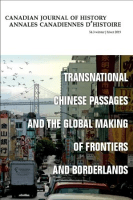
Canadian Journal of History-Annales Canadiennes d Histoire
Advancing Scholarship in Canadian HistoriographyCanadian Journal of History - Annales Canadiennes d'Histoire is a prestigious scholarly publication that serves as a vital forum for research in the field of history, particularly as it pertains to Canadian narratives and experiences. Published by University of Toronto Press Inc, this journal has been at the forefront of Canadian historiography since its inception in 1979, continuing to disseminate knowledge through its rigorously peer-reviewed articles up to 2024. Although it operates under a traditional access model, its Q3 category ranking in History and presence in global academic databases reflect its ongoing commitment to quality scholarship, catering to historians, academics, and students alike. With an inclusive scope that encourages interdisciplinary collaboration, the journal provides a platform for diverse perspectives on Canadian history, thereby enhancing our understanding of the past and its significance in shaping contemporary society. For those engaged in the study of history, particularly in a Canadian context, the Canadian Journal of History is an indispensable resource.
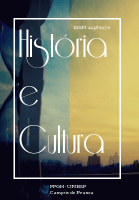
Historia e Cultura
Unveiling Diverse Perspectives on Our Shared HeritageHistoria e Cultura is a distinguished open-access journal focusing on the dynamic and multifaceted exploration of history and culture within the context of the Humanities. Published by the UNIV ESTADUAL PAULISTA JULIO MESQUITA FILHO, FAC CIENCIAS HUMANAS & SOCIAIS, the journal serves as a vital resource for researchers, professionals, and students engaged in the fields of historical research and cultural studies. Since transitioning to open access in 2012, Historia e Cultura aims to democratize knowledge by providing free, unrestricted access to high-quality articles that foster scholarly exchange and innovation. Although the specific impact factor remains undisclosed, the journal is dedicated to contributing to the academic discourse through rigorous peer-reviewed research. Situated in Brazil, Historia e Cultura is well-positioned to address both local and global issues, encouraging critical engagement with cultural heritage and identity. Researchers and scholars are invited to submit their work, ensuring that diverse perspectives are represented in the study of our shared history.
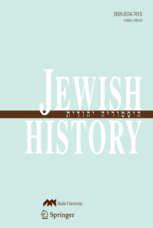
Jewish History
Preserving the Legacy: A Scholarly Journey into Jewish NarrativesJewish History is a significant academic journal published by Springer, focusing on the multifaceted historical narratives of Jewish communities worldwide. With roots tracing back to 1986, this esteemed journal offers an intellectual platform where researchers and scholars can engage critically with the vast and rich tapestry of Jewish heritage, culture, and experiences. Although it operates under a traditional subscription model, the journal has gained a notable standing in recent years, achieving a Q4 ranking in Cultural Studies and a Q3 ranking in History for 2023, reflecting its robust scholarly contributions. The journal is indexed in Scopus, with a rank of #808 in Arts and Humanities History and #754 in Social Sciences Cultural Studies, placing it within the competitive landscape of academic publishing. Its commitment to advancing the field of Jewish studies makes it an essential resource for researchers, professionals, and students alike, who seek to deepen their understanding of Jewish history from historical, cultural, and social perspectives.
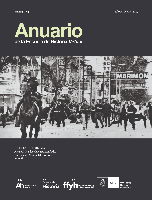
Anuario de la Escuela de Historia Virtual
Cultivating Knowledge in the Field of HistoryAnuario de la Escuela de Historia Virtual is a distinguished academic journal published by the Universidad Nacional de Córdoba, Facultad de Filosofía y Humanidades. With its focus on the field of history, this peer-reviewed journal aims to foster scholarly discussion and disseminate innovative research that contributes to the understanding of historical contexts and narratives. Since transitioning to an Open Access model in 2010, it has greatly increased accessibility for researchers, professionals, and students, thereby promoting a greater exchange of knowledge across linguistic and geographical boundaries. Published under the ISSN 1853-7049, the journal provides invaluable insights into historical analysis, methodologies, and interdisciplinary approaches, ensuring its relevance in contemporary academic discourse. Its commitment to high-quality, impactful research positions it as a vital resource within the historical scholarship landscape.

Historia Unisinos
Cultivating a Rich Exchange of Historical IdeasHistoria Unisinos, published by the UNIV DO VALE DO RIO DOS SINOS in Brazil, is a prominent academic journal dedicated to the field of history. With an ISSN of 1519-3861 and E-ISSN 2236-1782, this journal has established itself as a key resource for researchers, professionals, and students alike, providing a platform for high-quality research and scholarly discourse. In the 2023 rankings, it has been categorized in the Q3 quartile within the history domain and stands at #1162/1760 in Scopus's Arts and Humanities rankings, placing it in the 33rd percentile. Spanning from 2010 to 2023, the journal emphasizes innovative historical scholarship, critical analysis, and interdisciplinary approaches, fostering a deeper understanding of historical narratives and contexts. As an academic outlet, it serves both local and international communities, promoting the exchange of ideas and research findings that contribute significantly to the field of history.

Estudios de Historia de Espana
Exploring the Rich Tapestry of Spanish HistoryEstudios de Historia de España is a distinguished academic journal published by the Universidad Católica Argentina, Facultad de Ciencias Sociales, focusing on the multifaceted dimensions of Spanish history. With an ISSN of 0328-0284 and an E-ISSN of 2469-0961, this journal has embraced an Open Access model since 2015, promoting broader dissemination and accessibility of research. Although the journal currently holds a Q4 ranking in key categories such as Arts and Humanities, History, and Religious Studies, it continues to strive for academic excellence and relevance in the field, engaging scholars, educators, and students alike. With a commitment to publishing innovative and rigorous research, Estudios de Historia de España is crucial for advancing the understanding of historical narratives and interpretations in Spain and beyond. For submission and access options, researchers can refer to the journal's [official website](#) for additional information.
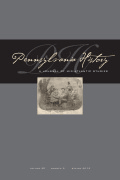
Pennsylvania History-A Journal of Mid-Atlantic Studies
Unveiling the Stories that Shape Pennsylvania's LegacyPennsylvania History: A Journal of Mid-Atlantic Studies is a prestigious academic journal published by Penn State University Press, dedicated to advancing the scholarship of historical studies in the Mid-Atlantic region of the United States. With an ISSN of 0031-4528 and an E-ISSN of 2153-2109, this journal has been a vital resource since its inception, providing critical insights into the cultural, social, and political landscapes of Pennsylvania and its neighboring states. Ranking in the Q2 category of the 2023 history quartiles, it plays an essential role in fostering dialogue among historians, researchers, and students alike, attempting to elevate the discussion surrounding Mid-Atlantic history. Notable for its consistent publication across multiple decades—specifically from 1971 and its converged years—it has established a legacy of scholarly excellence. While access options remain non-open, the journal curates comprehensive scholarly articles and contemporary research that collectively situate Pennsylvania within the broader narratives of American history. Engage with the robust academic contributions of Pennsylvania History to explore rich historical themes and narratives that shape our understanding of the Mid-Atlantic region.
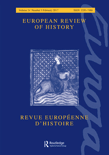
European Review of History-Revue Europeenne d Histoire
Fostering Interdisciplinary Dialogue in HistoryEuropean Review of History-Revue Europeenne d'Histoire, published by Routledge Journals, Taylor & Francis Ltd, is a prestigious, peer-reviewed journal that has been a leading forum for scholarship in the field of history since its inception. With an impressive 2023 Q1 ranking in the History category and a Scopus Rank of #304 out of 1760, the journal attracts a diverse audience of researchers, professionals, and students eager to engage with cutting-edge historical analysis. The journal publishes articles that bridge various historiographical traditions and methodologies, encouraging interdisciplinary dialogue and showcasing research from a European perspective and beyond. While not an open-access journal, the European Review of History offers rich content catering to those seeking to expand their understanding of historical discourse and promote innovative scholarship. The journal's consistent commitment to quality and relevance ensures its vital role in shaping the future of historical studies.

Arenal-Revista de Historia de las Mujeres
Celebrating Diversity in Women’s Historical NarrativesArenal-Revista de Historia de las Mujeres is a prominent academic journal dedicated to the exploration of women's history, cultural studies, and gender studies. Published by UNIV GRANADA, EDITORIAL in Spain, the journal has transitioned to an open-access model since 2013, ensuring accessibility for researchers and scholars worldwide. With its ISSN 1134-6396 and E-ISSN 1134-6396, it has established itself as a significant contributor to the discourse in its fields; it holds a Q3 ranking in Cultural Studies and History, along with a Q4 ranking in Gender Studies as of 2023. The journal publishes articles that reflect the complexities of women's historical roles and contributions across diverse cultures and periods, making it an essential resource for those investigating the intersections of gender, culture, and history. Its commitment to scholarly excellence is underscored by its rankings in Scopus, where it is placed within the 40th percentile for History and the 31st percentile for Cultural Studies. Arenal serves as a vibrant platform for interdisciplinary research and invites contributions from researchers, professionals, and students who seek to deepen understanding in these critical areas of study.

Topoi-Revista de Historia
Advancing the Dialogue of HistoryTopoi-Revista de Historia is a distinguished journal dedicated to advancing the field of historical studies. Published by the Programa Pos-Graduacao Historia - Universidade do Estado do Rio de Janeiro, this Open Access journal has been serving the academic community since 2000, fostering the dissemination of knowledge on diverse historical topics. With its ISSN 2237-101X, Topoi stands out in the field, holding a Q2 ranking in History (2023) and positioned in the 34th percentile of its discipline according to Scopus. The journal is committed to promoting high-quality research through a rigorous peer-review process, making it an invaluable resource for researchers, professionals, and students alike. The editorial team is dedicated to publishing innovative studies from both Brazilian and international scholars, ensuring a rich and comprehensive dialogue within the global historical landscape. Reach out to explore its latest contributions to the understanding of history, available to scholars around the world.